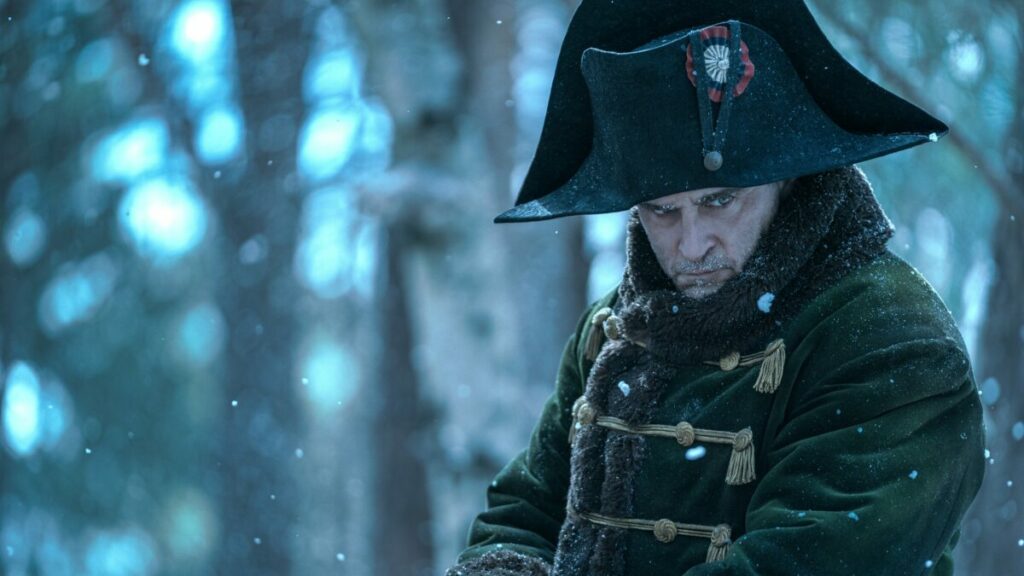Directed by Ridley Scott | Written by David Scarpa | 158 min | ▲▲△△△
Sir Ridley Scott, now in his 80s, continues to show he’s one of Hollywood’s great visual stylists. What he isn’t is a writer, so while the director of Alien, Blade Runner, Thelma & Louise, and Gladiator has made a number of beautiful-looking movies over the years, at the end of the day he’s only going to be as good as his screenwriter.
Scarpa, the writer of All The Money In The World has saddled this overlong, underwhelming epic with a loathsome protagonist and a love story that doesn’t work. Sure, it looks good, but so what? The lasting image is of Joaquin Phoenix in a series of funny hats with his fingers in his ears as cannons fire.
Phoenix plays the Corsican officer with big ambitions. He proves himself on the battlefield, rising in power and status in the revolutionary French government. Then he meets Josephine, essayed by Vanessa Kirby. They marry about an hour in, when it’s revealed they’re both under the age of 30 — that’s a real joke if you look at the lines in Phoenix’s face.
And it’s not the only one. The narrative clips along, the years fly by, and the only thing that’s consistent is Bonaparte’s immaturity and the movie’s wry humour around his bad behaviour. You can feel the picture straining to reach for Mel Brooks, and how much better would it have been if it had? It presents its protagonist as a boorish, insecure little prick, and I’ll say it: this work is far from Phoenix’s best — he’s stiff, mumbling, and unconvincing as a leader of men, never locating our sympathies from beneath his bluster. Fortunately, as an object of ridicule, there’s a few laughs to be had.
It would help if, aside from the lead pair, any other character manifested with a personality. Bonaparte has a brother, but we barely get to know him or any of the others, a series of rotating generals, officials, or emperors, who come and go as enemies and/or allies.
Kirby is easily the best thing in the movie, conveying the plausible emotions that come from her position having to please this overgrown manboy but otherwise with no real power. There’s an interesting film to be told from her perspective where we see what really happens when a woman is discarded because she couldn’t provide an heir. This isn’t it.
So little of the picture around her is coherent. For example, after it’s revealed Josephine’s been unfaithful Napoleon returns from the battlefield and confronts her. In one scene she dominates him — she tells him without her and his mother he’s nothing. He flinches and weeps. In the very next scene she’s begging him not to leave her, the tables are flipped. Is this characterization? Or did the filmmakers cut down the relationship stuff to the point where it makes no sense so more running time could be given to the battles?
The sequences of combat are something to see — Scott has lost nothing in his use of scale. The Battle of Austerlitz is particularly impressive, with cannons on a hillside opening up the surface of a frozen lake beneath the feet of retreating soldiers — not sure how historically accurate any of that is, mind you. Waterloo is also a showstopper, with an excellently-cast, late-arriving Rupert Everett as the Duke of Wellington. Scott over-relies on his favourite slate grey, desaturated colour scheme, but the eye candy and kineticism is still plenty evident.
But there’s so much of this film that passes by as mediocre period drama with actors — Kirby, mostly — doing their best to enliven things. If Napoleon is about the dangers of power hungry narcissists ruling nations then I suppose it tells that story well enough, but even so, there’s little reason to care about any of it other than the set pieces.













